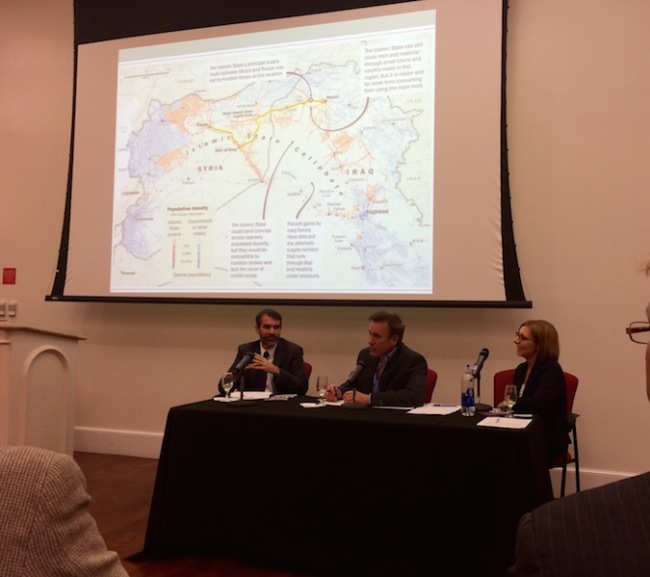
A diverse group of students, faculty members, Dallas natives, and more trickled into the Great Hall of Elizabeth Perkins Protho Hall on Thursday night for a discussion on ‘The Rise of ISIS.’
The event hosted by the Tower Center drew in a crowd of about 70 individuals eager to learn more about the extremist Islamic group.
“I think the two biggest questions are how did it get started and how do we end it,” said Lee Mulkey, a member of the Dallas Committee on Foreign Relations.
The key speakers of the event attempted to provide answers to these exact questions. Speakers included Pulitzer Prize winning writer Joby Warrick and George Washington University Professor Caitlin Talmadge.
Together they shed light on the early formations of ISIS and why the Iraqi army has continually failed to defeat them.
The event began 30 minutes later than scheduled with a brief message from the moderator, Joshua Rovner.
Rovner, the Tower Center’s Distinguished Chair of International Politics and National Security, opened the discussion identifying the two biggest questions the security and strategy program at SMU focus on: how do you win wars, and how do you win the peace?
The United States has failed to find to answers to either question while in Iraq, said Rovner.
Rovner continued to overview the current situation in Iraq, detailing that ISIS has been incredibly successful in their fight for power unlike most other extremist groups that have competed against them.
After Rovner concluded, Warrick outlined the significant moments and people that contributed to ISIS’s formation and success.
Warrick explained that an unlikely character formed ISIS. The key figure in the formation of the terrorist organization was Abu Musab al-Zarqawi.
In Warrick’s own words, Zarqawi was “a loser.” He was an “uneducated, unaccomplished thug” from Jordan that embraced extreme Islamic ideals.
Warrick argued that ISIS would not exist without Zarqawi and that Zarqawi, as we know him, would not exist without the Iraq invasion of 2003. This is an argument that he details more in his book, “Black Flags: The Rise of ISIS.”
The on-camera beheadings and radical violence that ISIS became known for originated with Zarqawi. In addition to this, Zarqawi committed deliberate and systematic violence to help gain better control, said Warrick.
Warrick continued to discuss Zarqawi at length, mentioning that most people viewed his ideas as too extreme, but his thuggish charisma attracted many loyal followers that would eventually become other members of ISIS.
After Warrick concluded, Talmadge focused her discussion on Iraq’s failure to stop the expansion of ISIS.
Talmadge stated that the failure on the Iraq military to stop this from happening is a situation of Iraqi politics.
“Iraqi civil-military relations undermined the country’s ability to generate military power from the resources that it possessed,” said. Talmadge.
Talmadge explained that while our military is a largely “apolitical institution that deals with external adversaries,” the Iraqi military’s primary purpose is to systematically and violently repress other groups in Iraqi society.
Talmadge stated that as the Iraqi military continued to focus on their goal of repressing other groups ISIS was not their focus.
The event concluded with the Q&A session with the two speakers and a book signing.








